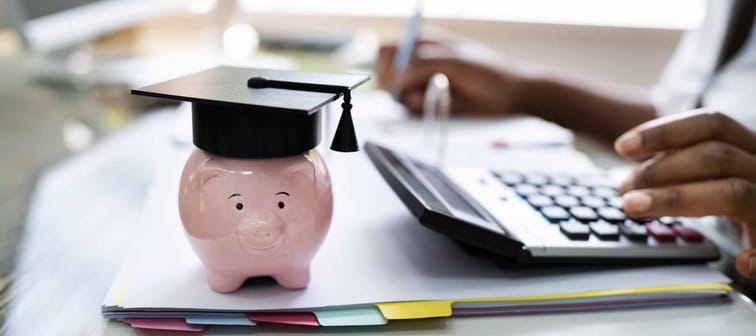Using student loans to help your credit score
If you’re still attending school, you probably haven’t thought too much about paying off your loans yet. I mean, payments aren’t required while you’re still studying and interest doesn’t accumulate, so why bother, right? But in reality, these interest-free years can be critical to your prospects of speeding up the debt repayment process after you graduate and being in a financial place where you’re capable of making the minimum payments necessary. Some people see student loans as a hindrance, but if you handle them correctly and use them to grow your credit score, it can your student loans can even be helpful when it’s time to get a mortgage or another type of loan. The below habits will not only save you massive amounts in interest payments once you’re done with school, but will also provide the financial safety net you need to consistently repay your loan and gradually build up your credit score.
Build credit as you spend
You should be working on steadily building good credit even before graduating, in case your credit score will take a couple of hits later on in challenging post-graduation years. The best way to do this is to get a basic student credit card for your day-to-day purchases, making sure to pay it off in full at the end of each month. Your credit score will steadily improve as you regularly pay off small debts to the card, and you can simultaneously earn rewards to boot. Aside from using a credit card, there are a number of other tools you can use to improve your credit score, like apps that offer advice and guidance.

Start saving
Everyone—even cash-poor students—can and should save. Budget your income and each month put away as much money as you can spare into a safe investment option, such as a GIC. If you’re able to save up enough and pay a lump sum when you graduate, that can shorten your loan repayment timeline drastically. Or, rather than making a large lump sum payment toward your student loan debt, you might opt to transfer your GIC money into a high-interest savings account so that you’ll have a relatively liquid source of funds in the event that you run into trouble making a monthly payment. Additionally, there are ways you can start investing as a student, even if it’s small amounts, so that your savings can grow while you’re still in school.
Proactively restructure your payments
If after you graduate it becomes clear that despite your best efforts you’ll be unable to consistently make your payments, don’t freak out! You may have options at your disposal that will help you either reduce or delay your repayment, or you might even consider student loan debt consolidation to make repayments easier.
Student loan repayment plans and interest rates can vary based on your province, your salary, and your degree. Be sure to keep yourself well informed of the conditions of your loan. As of 2016, students are no longer expected to start repaying their Canada student loans until they make a post-graduation salary of at least $25,000. Keep in mind, though, that interest nonetheless starts accumulating the second you graduate, so no matter how lean your financial situation might be it’s always best to at least pay off your loan’s interest each month.
Even if you’ve found a living salary, other unexpected expenses might make it still impossible to start chipping away at your loan balance. At this point, look into NSLSC’s Repayment Assistance Plan for an array of options ranging from total loan forgiveness to reduced monthly payments. Beyond that, you can also conduct a Revision of Terms to see if you’re eligible to have your total amount owing reduced.
The Repayment Assistance Plan doesn’t only offer reduced payments; you can also qualify to have your payments suspended completely. The key here is to look into these options before payments become impossible for you to make. In fact, if you’re more than 90 days delinquent on your payments, you’re no longer eligible for repayment assistance. It’s crucial to be proactive!
How you can self-sabotage your credit score
Saving for repayment before graduating, arranging your monthly repayment amount to be manageably low, and being diligent about making your monthly payments should shield you from deleterious changes to your credit score due to student loans. But not everyone is a responsible borrower, and it’s true that some post-grads can totally decimate their credit because of their failure to take student loans seriously.
Late payments
Similar to credit cards, late payments on student loan balances can wreak havoc on the credit score you worked so hard to build up in university. Remember: Payment history counts for 35% of your credit score! It’s admirable to have an aggressive repayment plan, but better to arrange for smaller, more manageable payments each month than huge monthly payments that you might not be able to make every time.
Although the balance might take up a lot of your mind, student loans are not your do-all-end-all when it comes to your credit score. Be sure to simultaneously keep up with utilities, credit cards, rent, and any other bills coming your way. Missing any of these for the sake of throwing money at your loans won’t do you any favours!
Defaulting
If your Canada Student Loan goes six years without any payment or acknowledgement from you, it’s written off. Each province has its own statute of limitations for provincial loans to be written off as well. You can also default on your loans by filing for bankruptcy. Your student loans will be eliminated as part of bankruptcy if you’ve been graduated for at least seven years.
Both the above options should be avoided if at all possible. Remember, although your loan balance might be gone, it’s never truly forgotten – especially not by your credit score! Personal bankruptcy stays on your report for a staggering ten years. If you’ve had to file, you should make sure you know how to help your score recover.
Student loans left to collection
If a Canada Student Loan goes nine months without payments, it’s defaulted and transferred from the NSLSC to the CRA for collections. Having outstanding fees in collections is notoriously destructive to a credit score. Not only will you be charged considerable fees, but the CRA can also withhold tax refunds or seize assets to balance your amount owed.
Keep in mind that although late payments, defaults and collections can cause serious damage to your credit score, it will never get to such a low that you can’t work your way back up. I’ve had my fair share of embarrassing reports, maxed out cards, and outstanding payments, and, although this was harmful to my credit score at one point, it is reversible. If you’re in the dumps about how you’re doing right now, take the steps necessary to get back on the right footing with your credit score.






